21世纪大学新英语视听说教程Unit 7
- 格式:ppt
- 大小:9.61 MB
- 文档页数:77
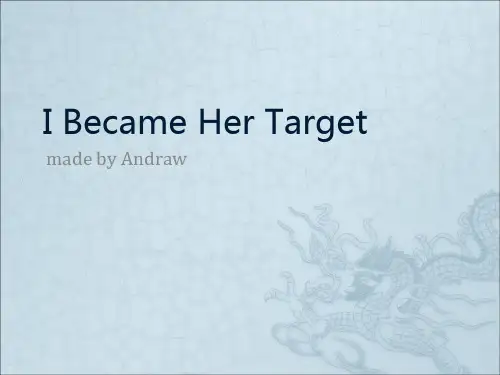

新标准大学英语视听说教程听力原文U n i tHappy First, written on the morning of August 16, 2022Unit 7-Conversation 1Mark: HiKate: Hi; Janet Have you been waiting longJanet: Not at all. What did you think of HeroKate: It was brilliant; thanks for suggesting it.Janet: Well; it was nominated for an Oscar; you know.Kate: That figures. It's a beautiful film.Mark: Yes. The costumes; and scenery were amazing;Kate: I'd love to know more about the emperor; he was cool. Who was he Janet: Qin Shi Huang — it's said he was the first emperor in the history of China — he unified China.Ka te: Did he WhenJanet: Er ... 221 BC.Mark: As long ago as thatWaitress: Hi guys What can I get you Kate: Yes; I'll have a coke; thanks. Mark: Er ... Just a coffee.Waitress: Sure.Mark: Tell us more ... Janet: Um ... Well; before that; there were seven big states and they had been fighting each other for many years. Mark: Right.Janet: It's called the Warring States Period. Anyway — Qin was king of the largest state and he defeated the six other states; one after another. It took him ten years to conquer them; each with a different strategy.Mark: What kind of man was heJanet: Well; he was brilliant; obviously. And also wise. He had this huge army — they were very powerful. After his army had attacked the first state; the next state surrendered without much fight. They were so terrified.Kate: WowJanet: What else The army leaders were very clever; they used a river to flood a city.Mark: That can't have been easy. Janet: Yes; anyway; after conquering the last state; Qin made himself Emperor of the whole of China.Mark: Was he the emperor who created the Terracotta WarriorsJanet: That's right. He was so afraidof death that he wanted them to guardhim in the afterlife.Unit 7-Conversation 2Becky: OK.Kate: Thank you.Mark: Thanks.Kate: So go on about Emperor Qin. It's really interesting.Janet: It is; isn't it Well; so he unified China and that was an incredible achievement. But as a result; huge numbers of soldiers were killed.Kate: About how manyJanet: Oh; I don't know; something like 500;000 menKate: That is huge.Mark: So how do the Chinese see Qin Janet: He's seen as the greatest emperor in Chinese history.Mark: Why Because he unified ChinaThat's a very good reason; mind you. Janet: Not only that. The thing is; asa result of the unification; he did many amazing things. He built roads allacross China; he standardized writing ... and also the money system. Oh; and the system for measuring and weighing things as well. Mark: So he was a great leader for China.Janet: Yes; he was; but he was alsovery cruel.Mark: Yes; but most emperors were cruel; weren't theyKate: Well I guess that's true. You're right.Mark: So did he have enemiesJanet:Of course;I think all great emperors have some enemies. Some people hated him so much they tried to kill him Mark: Was he the emperor who built the Great Wall of ChinaJanet: He built the first Great Wall. You see; tribes from the north were always trying to invade so he built a huge wall across China to stop them. Hundreds of thousands of men diedbuilding it.Kate: It's so sad — all those thousands of people dying.Mark: But then ... that's war; isn't it Unit 7-Outside viewOn the 25th of April each year; Australia and New Zealand celebrate Anzac Day; when they commemorate all the members of the Australian and NewZealand Army Corps who died in actionduring the First and Second World Wars; and in every armed conflict since then. We're here now at the Australian War Memorial at the start of the dawn service. They shall grow not oldAs we that are left grow oldAge shall not weary them nor the years condemnAt the going down of the sun and in the morningWe will remember them.Lest we forget.A verse from the poem. Ode to Remembrance by Laurence Binyon; is recited during the ceremony.Inside the Hall of Memory is the Tomb of the Unknown Soldier. This is the grave of a solider whose identity is not known and it represents all those soldiers who died in battle but were not identified.Twenty-four years after the ravages of World War I; war came to the mainland of Australia where air raids killed hundreds of service personnel and civilians. In Malaya; Korea and Vietnam; we answered the call as we have in Afghanistan and Iraq. Through it all the one unshakable truth has been a steadfastness; bom of the traditions of the Australian servicemen. Today; Australia's special day; they rememberin East Timor; on Bougainville; in Afghanistan and Iraq; on the island of Crete; at Gallipoli; they along with us; remember.Anzac Day is a public holiday in Australia. It is one of the most important national days of the year and certainly the most solemn one. Commemoration services are held in all the major cities in Australia and huge crowds attend to pay their respects to those who died. Servicemen and women from all the armed services in Australia march in procession. They fought in the Second World War and other conflicts since then that have happened around the world. The men in the trucks are all wearing decorations. They're veterans from the Second World War; and perhaps a few last survivors from the First World War. After the Parade the veterans will gather in a pub or club to talk and share memories. This veteran fought in the Second World War in Western Australia.Interviewer And what does Anzac Day mean to youVeteran Well; it means remembering not only those who didn't go home but the; the fact that you keep in touch with a lot of your ... friends.Unit 7-Listening inNews reportUS universities are experiencing a steady increase in the enrolment of student veterans with many troops returning home from wars in Iraq and Afghanistan. More than one million student veterans are using their Post-9/11 GI Bill benefits to earn a university degree or certificate.The Post-9/11 GI Bill is an education benefit programme for individuals who served on active duty after 10 September; 2001. the scholarship covers study-related expenses including tuition; fees; books and housing. Veterans can use the GI Bill at colleges; universities; trade schools and flight schools.Student veterans returning from war are typically older than the average student. Some have difficulty adjusting to the stress and demands of university life. Some also experience frustration with other students who don’t understand their past experiences.It is important for universities to provide veterans with the resources and support they need to succeed; and to help with the transition to university life.1.What is the news report mainly about2.To whom does the Post-9/11 GI Bill provide supportPassage 1There are many war novels but the novel I'm going to talk about today is unusual because it's war seen through the eyes of a child. The "eyes" are those of JG Ballard; one of Britain's most respected novelists.Let's begin with some information about Ballard. He was born in 1930; in Shanghai; where his father was a businessman; and he was only 11 years old when the city was occupied during World War II. Ballard and his family were placed in a prison camp and he has said that his experiences there affected him so deeply that it was 40 yearsbefore he felt able to write about them. "Twenty years to forget and 20 years to remember."The result of Ballard's experiences was a semi-autobiographical novel called Empire of the Sun; published in 1984. It quickly became a success and in 1987 it was made into a movie by Hollywood director; Steven Spielberg.Let's move on to the novel itself. Empire of the Sun tells the story of how a young boy; Jim Graham; survives the Japanese occupation. Interestingly; Jim is J G Ballard's first name and his second name is Graham. Also; Jim is the same age as Ballard - 11 -when the occupation begins.At the start of the story; Jim is living with his parents in a wealthy part of Shanghai. When the invasion begins; many of Shanghai's inhabitants flee from the city and Jim's parents do the same. But the boy becomes separated from them and finds himself all alone. He goes back to their empty home and lives alone there. Inevitably; he's found and then he's sent to a prison camp.It's a terrible four years; but the boy somehow survives. He steals food; finds ways of getting in and out of the camp; and is befriended by some Americans and a Japanese boy.Is there a happy ending Yes and no. Jim sees many people die; his Japanese friend is killed by the Americans. Butat the end of the war; he gets back to Shanghai and is reunited with his parents.Jim's experiences are terrible; as a child who discovers the depths of human cruelty. But he learns also about the strength and courage that is possible; even in these circumstances.Both the great power and the truthof the novel come from the fact thatit's based on the author's own experiences. The general opinion ofcritics is that Empire of the Sun is one of the best war novels ever written - so read it; it's worth it.Passage 2Host On Women's World; today; we lookat women's role in the Second World War and the important part they played in it. In the First World War; women had workedin factories and as nurses; both at home and at the front. In the Second World War; women were even more essential to the war effort. Doris Watts was just 18 when the war began and Mavis Grey was only 20.Host Do you remember how you felt;Doris; the day thewar was declaredDoris Oh yes ... of course I do. I felt frightened of course;but we had known it would happen. The first thing; more thananything I think; that I felt was ...was that I wanted to dosomething You know; do something useful;so I joined theLand Girls.Host Ah; yes; the Women's Land Army.That was anorganization started in the First World War. Women worked inagriculture as the men were awayfighting. Did you enjoy the experienceDoris Not really. It was very hard work; very physical. You never saw anybody except the officer coming to inspect your work. So when I heard about the WAAF I signed up.Host That's the Women's Auxiliary Air Force. WAAF; forshort. So why the WAAFDoris I'd always thought planes were very exciting. Andit's silly but I liked the light blue uniforms.Host That's a good enough reason Now; Mavis; you were in the WAAF at the same time as Doris. Can you tell us more about itMavis Yes. Organizations like the WAAF were a way for women to join the armed forces; since they weren't allowed to fight. Instead; the army; the navy and the air force all had support services; which women could join.Host And Doris. What kind of things did you have to doDoris Oh; well; a lot of different things. I worked in transport and catering. We were very young but we were given a lot of responsibility.Host And what did you do; MavisMavis Various jobs but eventually I worked on a fighter station; trackingthe German bombers as they flew towards London. It was very exciting.Host Was it ever dangerousDoris Yes; we were always in danger of being bombed. They tell me that over1;500 young women lost their lives. I was lucky.Host And what about social lifeMavis We did have some wonderful parties. And of course I met my husband; Eric. He was an electrician at the station.Host One last question; Doris. Do you think women's work in the forces changed things for womenDoris Without a doubt. Oh absolutely After the war the position of women could never be the same again - we'd contributed so much.Host Doris and Mavis; thank you both.。
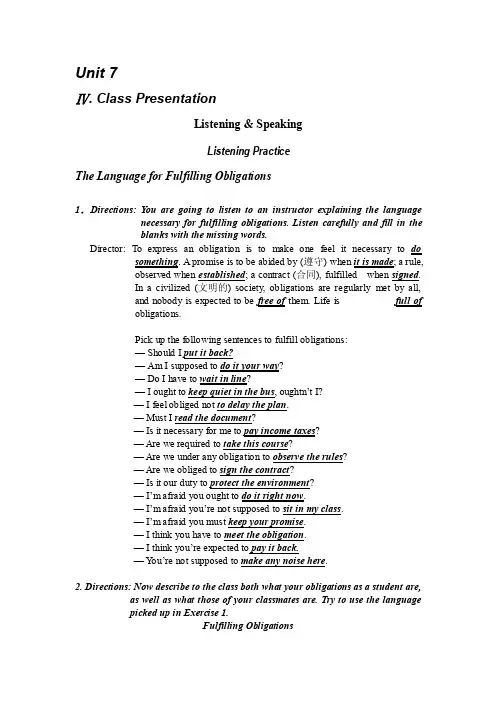
Unit 7Ⅳ. Class PresentationListening & SpeakingListening PracticeThe Language for Fulfilling Obligations1.Directions: You are going to listen to an instructor explaining the language necessary for fulfilling obligations. Listen carefully and fill in theblanks with the missing words.Director: To express an obligation is to make one feel it necessary to do something. A promise is to be abided by (遵守) when it is made; a rule,observed when established; a contract (合同), fulfilled when signed.In a civilized (文明的) society, obligations are regularly met by all,and nobody is expected to be free of them. Life is full ofobligations.Pick up the following sentences to fulfill obligations:— Should I put it back?— Am I supposed to do it your way?— Do I have to wait in line?— I ought to keep quiet in the bus, oughtn’t I?— I feel obliged not to delay the plan.— Must I read the document?— Is it necessary for me to pay income taxes?— Are we required to take this course?— Are we under any obligation to observe the rules?— Are we obliged to sign the contract?— Is it our duty to protect the environment?—I’m afraid you ought to do it right now.—I’m afraid you’re not supposed to sit in my class.—I’m afr aid you must keep your promise.— I think you have to meet the obligation.—I think you’re expected to pay it back.—Y ou’re not supposed to make any noise here.2. Directions: Now describe to the class both what your obligations as a student are,as well as what those of your classmates are. Try to use the languagepicked up in Exercise 1.Fulfilling Obligations1) Directions: Before you listen to the first conversation, read the following wordsand expressions which may be new to you.Everything’s going my way. 一切都称心如意。
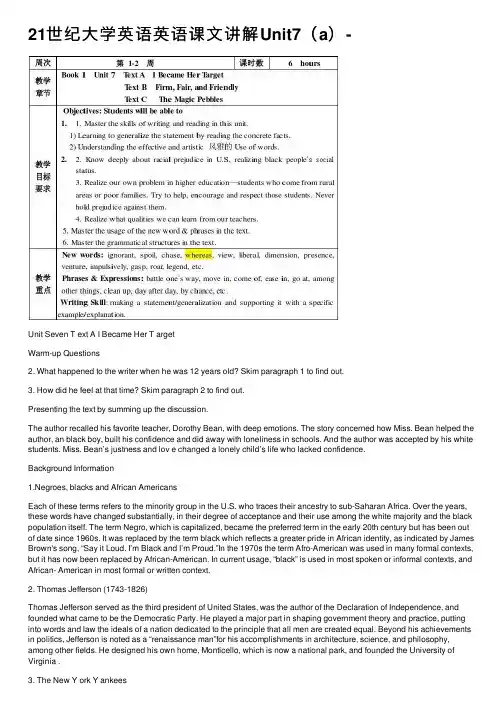
21世纪⼤学英语英语课⽂讲解Unit7(a)-Unit Seven T ext A I Became Her T argetWarm-up Questions2. What happened to the writer when he was 12 years old? Skim paragraph 1 to find out.3. How did he feel at that time? Skim paragraph 2 to find out.Presenting the text by summing up the discussion.The author recalled his favorite teacher, Dorothy Bean, with deep emotions. The story concerned how Miss. Bean helped the author, an black boy, built his confidence and did away with loneliness in schools. And the author was accepted by his white students. Miss. Bean’s justness and lov e changed a lonely child’s life who lacked confidence.Background Information1.Negroes, blacks and African AmericansEach of these terms refers to the minority group in the U.S. who traces their ancestry to sub-Saharan Africa. Over the years, these words have changed substantially, in their degree of acceptance and their use among the white majority and the black population itself. The term Negro, which is capitalized, became the preferred term in the early 20th century but has been out of date since 1960s. It was replaced by the term black which reflects a greater pride in African identity, as indicated by James Brown's song, “Say it Loud. I’m Black and I’m Proud.”In the 1970s the term Afro-American was used in many formal contexts, but it has now been replaced by African-American. In current usage, “black” is used in most spoken or informal contexts, and African- American in most formal or written context.2. Thomas Jefferson (1743-1826)Thomas Jefferson served as the third president of United States, was the author of the Declaration of Independence, and founded what came to be the Democratic Party. He played a major part in shaping government theory and practice, putting into words and law the ideals of a nation dedicated to the principle that all men are created equal. Beyond his achievements in politics, Jefferson is noted as a “renaissance man”for his accomplishments in architecture, science, and philosophy, among other fields. He designed his own home, Monticello, which is now a national park, and founded the University of Virginia .3. The New Y ork Y ankeesPlaying in the borough 纽约市五个⾏政区之⼀of the Bronx in New Y ork City, the Y ankees are the most famous and the most successful team in the history of major league baseball. They have won the World Series championship, which is played each October, more often than any other team.4. Racial prejudice/ segregation in the United StatesA system of racial segregation arose soon after the American Civil War in most former slave states. In 1948, President Truman ordered to put an end to segregation in the armed forces and segregation of the races in public schools was banned in 1954. However, most white schools remained totally segregated by the mid-1960s regardless of the government’s many efforts, school desegregation has still not seen accomplished in much of the U.S.5. Franklin Delano Roosevelt (1882—1945)The 32nd U.S. president (1933---1945), considered by many to be the greatest American president of the 20th century. He launched the economic and social reform program, “New Deal” to help the “forgotten man” during the Great Depression. He also led the country through most of World War II. He was reelected for a fourth term in 1944, but died in 1945.6. the Louisiana PurchaseThis term refers to a land deal made between U.S. president Thomas Jefferson and Napoleon Bonaparte of France in 1803. Jefferson authorized the purchase of land from the Mississippi River westward to the Rocky Mountains and from the Gulf of Mexico northward to Canada for roughly $ 15million. Though it was a great Bargain, doubling the size of the U.S. at the time and adding richly productive farmlands, the Louisiana Purchase was controversial because it was unclear that the president had the authority to make such a purchase without the approval of Congress.7. grade schools in the United StatesGenerally, American schools consist of elementary schools (kindergarten to 5th 0r 6th grade), middle schools (grade6-8) or junior high schools(grades7-9), and high schools(grade 9-12 or 10-12). Many children go to kindergarten at age five, and every child begins first grade at age six. Students do not pay tuition in grades1-12.Text OrganizationIn this passage “I Became Her Target”, American Civil Rights leader Roger Wilkins talks about the difficulty of being the only black child in the classroom during the 1940s. He describes with gratitude a teacher who respected him enough to challenge him and hold him to high standards. And it can be divided into four parts :Part one: introduction (Para.1-2): This part introduces the teacher and the author's situation:a black newcomer in the neighborhood ignored by others and feeling lonely;Part two: beginning (Para.3-4): It's so lucky that a teacher, Dorothy Bean treated me differently. Part three: development (Para5-14): some stories between the author and the teacher show us how the teacher helped him in developing him and making him another kid in the school.Story 1 Para5-6 The teacher asked me a question and made me no more a dark presence in class. Story 2 Para. 7-11 The teacher trained to have a critical and creative thinking.Story 3 (climax ⾼潮) Para.12-14 While I was absent-minded in class, the teacher reminded me in his particular way, making me part of a story in class, so I was known to everybody.Part four: ending (para14 ) I was accepted by other people.Through the text, the author uses the technique of making statement or generalization and then supporting it with a specific example or explanation. By doing so, he makes his ideas more convincing and also easier to understand.Words & Expressions checkup1.Favorite: adj. & n. best liked, person or thing liked more than others 最喜欢的, 最受喜爱的⼈或物Who is your favorite teacher? 你最喜欢的⽼师是谁?He is a favorite of his mother’s.他是母亲最疼爱的孩⼦。
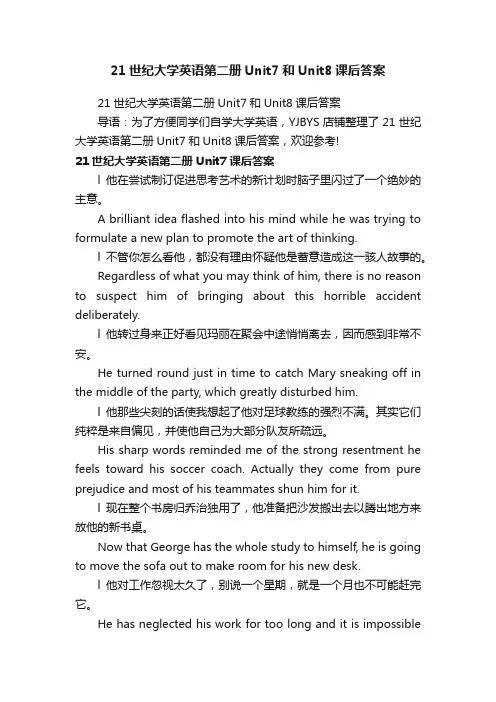
21世纪大学英语第二册Unit7和Unit8课后答案21世纪大学英语第二册Unit7和Unit8课后答案导语:为了方便同学们自学大学英语,YJBYS店铺整理了21世纪大学英语第二册Unit7和Unit8课后答案,欢迎参考!21世纪大学英语第二册Unit7课后答案l他在尝试制订促进思考艺术的新计划时脑子里闪过了一个绝妙的主意。
A brilliant idea flashed into his mind while he was trying to formulate a new plan to promote the art of thinking.l不管你怎么看他,都没有理由怀疑他是蓄意造成这一骇人故事的。
Regardless of what you may think of him, there is no reason to suspect him of bringing about this horrible accident deliberately.l他转过身来正好看见玛丽在聚会中途悄悄离去,因而感到非常不安。
He turned round just in time to catch Mary sneaking off in the middle of the party, which greatly disturbed him.l他那些尖刻的话使我想起了他对足球教练的强烈不满。
其实它们纯粹是来自偏见,并使他自己为大部分队友所疏远。
His sharp words reminded me of the strong resentment he feels toward his soccer coach. Actually they come from pure prejudice and most of his teammates shun him for it.l现在整个书房归乔治独用了,他准备把沙发搬出去以腾出地方来放他的新书桌。
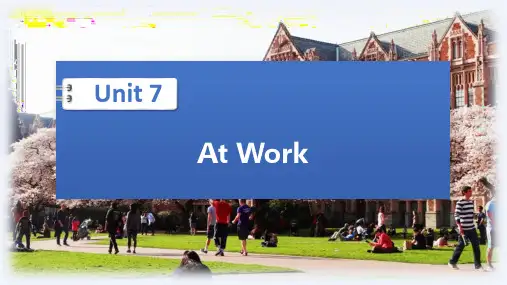
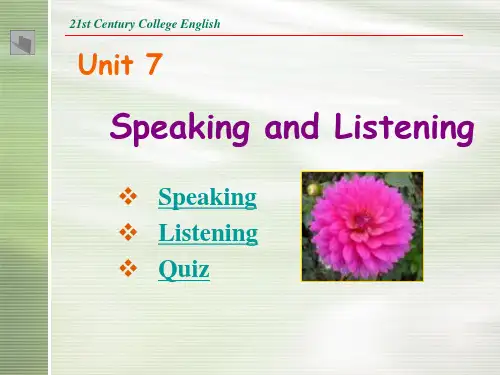
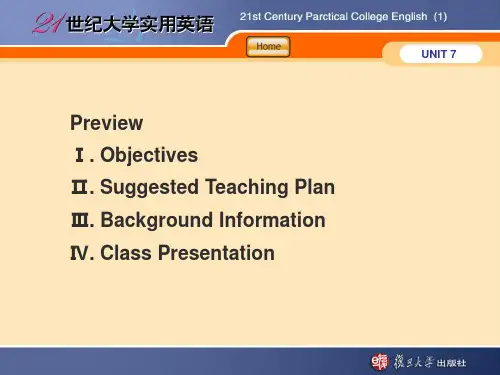
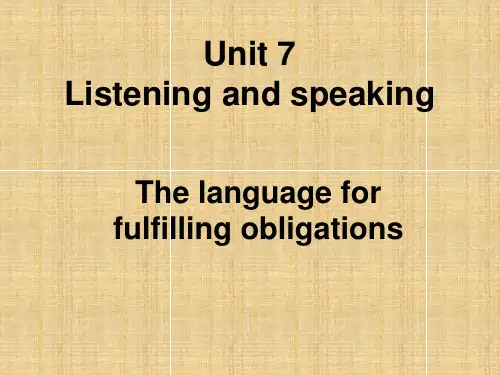

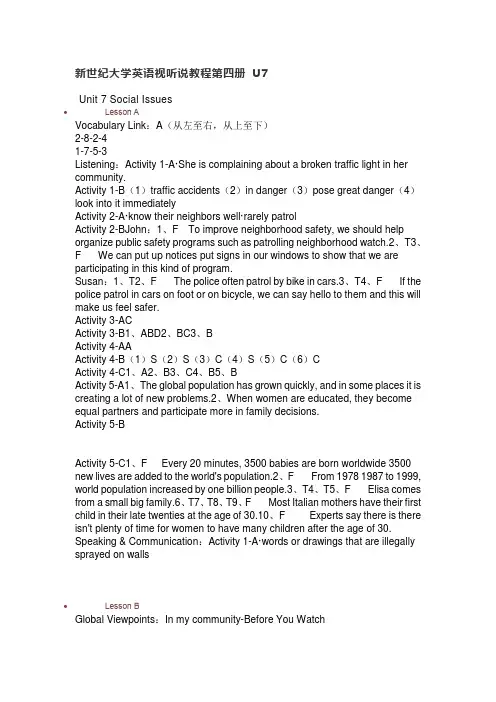
新世纪大学英语视听说教程第四册U7Unit 7 Social Issues•Lesson AVocabulary Link:A(从左至右,从上至下)2-8-2-41-7-5-3Listening:Activity 1-A·She is complaining about a broken traffic light in her community.Activity 1-B(1)traffic accidents(2)in danger(3)pose great danger(4)look into it immediatelyActivity 2-A·know their neighbors well·rarely patrolActivity 2-BJohn:1、F To improve neighborhood safety, we should help organize public safety programs such as patrolling neighborhood watch.2、T3、F We can put up notices put signs in our windows to show that we are participating in this kind of program.Susan:1、T2、F The police often patrol by bike in cars.3、T4、F If the police patrol in cars on foot or on bicycle, we can say hello to them and this will make us feel safer.Activity 3-ACActivity 3-B1、ABD2、BC3、BActivity 4-AAActivity 4-B(1)S(2)S(3)C(4)S(5)C(6)CActivity 4-C1、A2、B3、C4、B5、BActivity 5-A1、The global population has grown quickly, and in some places it is creating a lot of new problems.2、When women are educated, they become equal partners and participate more in family decisions.Activity 5-BActivity 5-C1、F Every 20 minutes, 3500 babies are born worldwide 3500 new lives are added to the world's population.2、F From 1978 1987 to 1999, world population increased by one billion people.3、T4、T5、F Elisa comes from a small big family.6、T7、T8、T9、F Most Italian mothers have their first child in their late twenties at the age of 30.10、F Experts say there is there isn't plenty of time for women to have many children after the age of 30. Speaking & Communication:Activity 1-A·words or drawings that are illegally sprayed on walls•Lesson BGlobal Viewpoints:In my community-Before You WatchIn my community-While You Watch1、are2、don't have3、noise4、fire5、a lot6、bothersGlobal issues-Before You Watch1、Global warming2、Hunger3、Spread4、Poverty5、Disease6、HIV7、AIDSGlobal issues-While You Watch AGlobal issues-While You Watch B(1)The oceans are rising as well as the temperatures(2)before it's too late(3)the world get together and help to make sure(4)everyone gets a chance to learnCity Living:Preview-BPreview-CPreview-D1、conducted a survey2、make a mistake3、interesting viewpoint4、rush hour5、affordable apartments6、push yourself7、noise pollution Preview-EWhile You Watch-A(从左至右,从上至下)2-3-64-5-1While You Watch-B1、F The reporter is conducting a survey about singles in the city city living.2、F Sun-hee and Takeshi say that air noise pollution is a problem in the city.3、T4、F What Sun-hee likes most about New York is the people restaurants.5、T6、F According to Takeshi Sun-hee, New Yorkers can be very rude.7、F Takeshi thinks you need a lot of money time to enjoy everything that the city has to offer.While You Watch-C(1)Do you have a couple of minutes(2)This won't take long(3)Do you agree, disagree, or have no opinion about(4)Me too(5)Rush hour in the city has become unbearable(6)I totally agree(7)traffic's been an issue here for years(8)with all the construction going on(9)it's not an issue for me(10)I guess(11)I like the fact that there are so many opportunities (12)push yourself(13)it goes the other way too(14)like if you make a mistake (15)waiting to take your place(16)talentedWhile You Watch-D1、They disagreed about life in New York. Sun-hee said there were many problems related to living in the city, but Takeshi said it wasn't that bad.2、Sun-hee said "Enjoy it? If you can get there in this traffic!" She was being sarcastic as she thought it was hard to enjoy anything in New York because the traffic was so bad.3、Takeshi listed the good things in the city such as beautiful buildings and interesting places.4、The reporter left because she had finished her survey. It was not rude of her to leave. It was however rude of Takeshi and Sun-hee to engage in an argument during her interview.After You Watch-A1、you know?2、I guess3、Where do I start?4、it goes the other way tooAfter You Watch-B(1)on the sidewalk(2)what they liked and disliked(3)seemed to have different opinions about other issues(4)pointed out that there was not enough parking, too few affordable apartments(5)too much to enjoy in the city(6)arguing about the issues(7)But see(8)I told you New Yorkers were rude。
Unit 7 Holidays and VacationsPart 1Task 1Exercise 11. B2. D3. A4.C5. DTask 2Exercise 11. C2. A3. B4.D5.AExercise 21.religious issues2.rarely3.churchgoer non-churchgoer Christians non-ChristiansPart 2Task 1Exercise 11.getting together lunar calendar the celebrations stretch far beyond the borders of China.2.normal theatre production professionals volunteers local community landmarksbackstreets Chinatown3.special free musical performances guess-the-mooncake-flavour fan danceexercise 21. F2.F3. F4.T5.TTASK 21.family reunions football2.civil holiday religious spiritual Thanksgiving may be the only time of year wheneveryone gets together long-distance travel3.turkey side dishes sweet potatoes dessert pumpkinAdditional listeningEXERCISE 11. A2.D3.C4.B5.AEXERCISE 21. It is a program that lets foreign students work in the United States during their summer vacations. (The State Department administers it for full-time college or university students who speak English well. Students come on a J-1 exchange visa. They can work for up to four months during their school break. They generally work in service jobs in stores, hotels, restaurants and amusement parks. But summer internships are also permitted.)2. They are supposed to be paid the same as Americans.3. Sally Lawrence advices students to avoid unapproved groups offering services, and to researcha few different sponsors.4. Sponsors must confirm the English language ability of students and make sure they are currently in school.5. Sponsors do not all charge the same price for their services. Another difference: some sponsors arrange employment and housing for students before they leave home. Others permit students to find their own jobs after they arrive.PART 1Task1HOLIDAY FUN FOR EVERYONEIn china, the spring festival is the most important celebration of the year. Holiday celebrations take many forms; it can be a time to be merry, to exercise, to learn and to reflect. We take a look at how some Chinese people spend the holiday. Ask anyone about their spring festival plans, and the same place will always pop up.Temple fairs have been an integral part of spring festival rituals for many generations. While the general idea is to have fun and deliver silent prayers, there are various ways to accomplish this. People throw coins to strike a lucky bell or patiently join a zigzagging queue to touch a lucky zodiac animal on the wall. They are all asking for blessings.if yo u don’t like the cold winter weather, indoor temple fairs offer a cozy atmosphere to stroll around. Booths are set up selling everything from desserts to decorations. Toys in the shape of an ox are in hot demand.Elderly people like to sit down with a cup of tea, and tap their fingers to the rhythms of a Peking opera performance. The LaoShe Tea House in downtown Beijing is doing a bustling trade, not to be overshadowed by temple fairs.But for the adventurous type, it’s time to set out.With the global economic downturn eating into travel package prices and fuel surcharges suspended on domestic flights, this spring festival is a great time to travel in china or abroad. Travel agencies say airfare prices to foreign destinations have dropped thirty percent, with the Maldives, Bali, Sampan, all hot destinations.While some people are heading to the beach, others are hitting the slopes. Seeking an adrenalin rush, more and more Chinese people are taking up skiing. The sport requires a lot of energy, so does a class of fencing or taekwondo.After a spring festival feast, it may be time to burn a few calories. Hitting the gym is the choice for many commuters, who struggle to find time on workdays to work up a sweat.The new year hoopla is taking a quiet and elegant turn at an ongoing exhibition at the national art museum of china. The Chinese folk arts and crafts show gives a mind-boggling look at the country’s exquisite craftsmanship.Covering all nine halls of the museum’s first floor are 350 objects chosen from 31 provinces, municipalities and autonomous regions on the Chinese mainland. Visitors receive more than a lesson on art. Each work comes with its own history to tell. This is the first ever exhibitions of Chinese folk arts and crafts in the museum’s 46-year history. The exhibition gives an insight into less well known traditions, and runs into early February.Browsing for the latest release at book fairs and in bookstores is another popular way to spend free time over the holiday.With so many options around, the question now is: how will you spend the holidays?Task 2Do you celebrate Christmas?CNN’s bill Schneider reports on a poll that looks at people who celebrate the Christmas holiday. Americans are divided over many religious issues, but Christmas is not one of them. In a CNN poll conducted by the opinion research corporation, 94% of Americans say they celebrate Christmas; nearly three quarters send Christmas cards and have a Christmas tree in their home. Oh, well, people do that for the kids? Nope, more than seventy percent of Americans who have no children at home put up a Christmas tree. Religious people, right? Nope. Even Americans whorarely go to church put up a Christmas tree. But what kind of tree? That’s where things are changing. Ten years ago, a third of Americans put up a real tree. Now that number is down to twenty-two percent. Today most Americans use artificial trees. Maybe because it’s cheaper than buying a new type tree every year; maybe because it is safer; maybe because people are more environmentally conscious, or maybe it is just easier. Putting up Christmas lights is not easy. But nearly six in ten Americans do it including this woman in Los Angeles who happens to be Jewish.I don’t think Santa Claus and talking snowman and flying reind eer and candy-cane trees have any religious significance at all.”She happens to live in an orthodox Jewish neighborhood. Are her neighbors offended? Some are, some are not.I am not an orthodox Jew, and I think it’s unusual that merry puts on, but you kno w, it is ok, doesn’t faze me. I think it’s pretty.Christmas is less and less likely to divide churchgoers and non-churchgoers, people with and without kids, even Christians and non-Christians. They can all agree on one thing: it is pretty. Part 2Task 1On 25th September this year, people all over China will be getting together to eat with their families, look at the moon and celebrate one of the biggest festivals in Chinese lunar calendar. However, the celebrations stretch far beyond the borders of china. Here in the UK events are taking place for Chinese people living here, and to teach the people of Britain more about this popular festival.The Soho theatre in London conducted a study which showed that Chinese Londoners don’t engage much with the arts world. As a result, moon walking in china has been created to celebrate the mid-autumn festival.This is no normal theatre production though, as it doesn’t take place in the theatre. Theatre professionals and volunteers from the local community will take audiences around the streets of Soho on a magical lantern-lit walk through the landmarks and backstreets of Chinatown.They tell the story of three generations of Chinese Londoners who all cross paths one night in Chinatown. Rabbits, karaoke and a woman who lives on the moon all feature prominently.It’s the Soho theatre’s first site-specific production and looks to be a unique way of marking the famous Chinese festival.And the celebrations don’t stop there! In early October the British museum is actually op ening late for a special free mid-autumn festival event. There will be Chinese musical performances, a guess-the mooncake-flavour game and you can learn how to perform a fan dance.You can also try your hand at a variety of other traditional Chinese arts and crafts, as well as learning mandarin and learning more about the history of china.The Chinese population in the UK is quite large, so no doubt there will be events happening not only in the capital, but all around the country.However you are celebrating, we hope you have fun. Happy mid-autumn festival from everyone at BBC learning English.TASK 2Thanksgiving: filled with family traditions and foodWelcome to this is American in VOA special English. I’m barber clineAnd I’m Steven ember. Our subject this week is what the writer o Henry called the one day that is purely American-thanksgivingThis Thursday is Thanksgiving Day. This is the 143rd official observance of the holiday. But the tradition is much older. Thanksgiving is an autumn harvest festival like those found in many cultures.Today the holiday is a time of family reunions, parades and watching football games on television. And, oh yes, food. For millions of Americans, thanksgiving is a day spent cooking, eating and talking.Thanksgiving is what the social scientists call a civil holiday. It is not religious but it does have spiritual meaning. For some families, thanksgiving may be the only time of year when everyone gets together. The government says the Sunday after thanksgiving is the busiest day of the year for long-distance travel as people return form greetings.Now we come to part of the holiday that thanksgiving memories are often made of-the big Thanksgiving Day meal. Some families serve ham. Others serve a meatless dinner. But the traditional main dish is turkey. Most people cook the bird in an over; some prepare the turkey other ways, like fried in oil.Turkey on thanksgiving is usually server with a bread mixture inside. Some Americans call it stuffing; others call it dressing. Popular side dishes on thanksgiving include cranberries, sweet potatoes and green beans. Then for a rich, sweet dessert there is often pumpkin pie or pecan pie. Many thanksgiving tables also are heavy with other dishes, often brought by guests. And if the guests eat all that is served, they too will feel heavy.Some people like fruit soup, green salads and baked potatoes with their turkey. Others like baked squash, creamed onions, creamed spinach and corn pudding. Many people eat more at thanksgiving than any other time of the year.For people who do not have much food or a home to go to at thanksgiving, charity groups play an important part. To help the needy, religious and service organizations across the country serve special thanksgiving meals.Additional listeningSummer work/travel brings many students to usThis is the VOA special English education report.This week, we answer a question from a student in Odessa, Ukraine. Marushra wants to know about a program that lets foreign student work in the United States during their summer vacations. The program is called summer work/travel. The State Department administers it for full-time college or university students who speak English well.Students come on a J-1 exchange visa. They can work for up to four months during their school break. They generally work in service jobs in stores, hotels, restaurants and amusement parks. But summer internships are also permitted.Summer in this case means summer in the student’s country. Those from south of he equator come to the united states during the northern winter.Students cannot work as housekeepers in private homes or be involved in patient care. And they are supposed to be paid the same ad Americans.Congress created this popular program under a nineteen sixty-one law, the mutual educational and cultural exchange act. Last year, one hundred fifty thousand students came to the United States this way.Students can do the summer work/travel program more than once.Sally Lawrence heads the state department office responsible for the program. She says students should begin to gather information a year before they want to travel.More than fifty organizations are approved to act as sponsors. Sally Lawrence advices students to avoid unapproved groups offering services, and to research a few different sponsors.Sponsors must confirm the English language ability of students and make sure they are currently in school. But sponsors do not all charge the same price for their services.Another difference: some sponsors arrange employment and housing for students before they leave home. Others permit students to find their own jobs after they arrive.Sally Lawrence says the first thing to do is to find the list of sponsors on the web page for J visa exchange programs.The address is a little long, but here it is: /education/jexchanges. Click on designated sponsor list, then choose summer work/travel under category description. For more information about the program, go to the main page and click on private sector programs.To make it easier, we’ll post a link at . And that’s the VOA special English education report, written by Nancy Steinbach. I’m Steven ember.。
Economy1Task One: Gold Rush(Karen Koh, Anchor)Well, the hope that the conflict in Iraq will be solved diplomatically continues to take the shine out of gold markets. But for investors who still consider the precious metal a safer haven than the markets, Paula Hancocks looks at what you can get for your money.(Paula Hancocks)Diamonds may be a girl’s best friend, but when times are hard, you’re better off with gold.As equities fall, gold looks attractive. As the US dollar weakens, gold looks like a flight to quality. And as political uncertainty hits confidence and growth, gold is a favorite safe haven. Not surprising then, the price has risen almost 85 dollars an ounce in the last year alone. But how doyou go about buying it?(Mike Temple, Gold Investmenter)It’s best if you’ve got 10,000 dollars to either buy bullion coins. Preferably the Krugerrand, cause they’re cheaper as there’s a big market for them...(Paula Hancocks)My unfortunately theoretical 10,000 dollars, would buy me either 30 Krugerrand, or about nine 100 gram bars. But the hidden cost of buying physical gold is in the storage and the security.Another option is to put your money into a mutual fund. That way your investing in the shares of gold mining companies, like the world number one, US based Newmont Mining. The Merrill Lynch Gold and General Trust rose 53 percent last year as global stock markets fell.(Rchichard Davis)We would advise investors to only put a very small part of their portfolio into the gold shares.We would say maybe only 3 to 5 percent of their portfolio should be invested in gold equities. Because, they can do very well when the gold price moves up, but they can also perform quite poorly if the gold price moves down.(Paula Hancocks)Gold is ce rtainly back in fashion. Although if you’re looking purely for profit, the experts saythat buying gold jewelry is probably not the best option, as you are paying a lot more for workmanship. Although from a purely aesthetic point of view, this does look far better around my neck than a gold bar. With jewelry, you’re also paying for the shop markup. It has to be a case of mixing business with pleasure.(Ajit Mulia)At least you have it with you, it’s controlled by you, Rat her than these foreign managers and stockbrokers, you know. You can wear it, you can use, and in a rainy day, you know, you can dispose it, And get the full price of your gold back.2(Paula Hancocks)The price of gold may have been hovering around six-year highs in recent days, but those in the know say the precious metal is still cheap, below 350 dollars an ounce, when it hit as high as 850 dollars in 1980. Task Two: Celebrating 10 Years of the EuroFinance ministers from the European Union member countries have attended the Brussels Economic Forum. The two-day event is to celebrate ten years of the European Monetary Union and also the Euro currency.In his opening remark to the forum Thursday, the Euro Group President gave his assessment of the Economic and Monetary Union’s achievements and t he challenges ahead.(Jean-Claude Juncker, president of Euro group)“It’s obvious that the euro has been a success. It was not easy to come to a merger of 15 national currencies into one single currency. This single currency has developed into the second l argest currency reserve area. This single currency is protecting us against external shocks.”The Forum comes at a time when EU nations are still reluctant to give up their individual seats at major global economic talks in favor of EU seat.The European Commission is pushing for the 15 Euro nations to take a joint Euro seat at key economic institutions such as the G-Seven.In 1998, EU leaders named the eleven countries that would merge their currencies into the single unit, the Euro, but it took 4 years for the countries to physically adopt the Euro.Since 2002, other nations have joined the group and there are now 15 countries in the Euro zone.Task Three: Bring Your Finger into the Store(Hattori)What if you could buy a week’s worth of groceries without ever handing over a credit card, debit card, check or any cash? It may sound impossible, but a Seattle store has the technology to make it happen. Deborah Feldman from our affiliate KING TV has the story.(Deborah Feldman )For some people, paying for groceries with a debit card is novel enough, but for others, carrying a wallet full of cash and credit cards is nothing short of a hassle. That’s why on Wednesday, this Thriftway will start giving customers the option of using finger image technology as a way to pay for their everyday produce.(Paul Kapioski, store owner )You don’t need to bring your card into the store. You just need to bring your finger.(Feldman)Thriftway’s owner says this is the first time biometrics will be used in a Seattle store. Up unti l this point, it’s only been discussed as a safety measure in airports or home and business security systems. Depending on the system, people can use their fingers or their eyes as a personal security code.In this case, Thriftway’s system uses just a third of a person’s fingerprint to verify3 the customer is who she claims to be, and then automatically links to their accounts, so no fears of stolen identities.(Kapioski)In the Seattle area, we’re so used to new technical things. I think it will be a big hi t. (Feldman)But it’s not a big hit with everyone. Some worry of voluntary fingerprint scan in this store could lead to non-optional screening devices down the line.(Unidentified Female)It does not sound like something I would want to do.(Feldman)Why not?(Unidentified Female)Because I think that we’re embarking on some pretty serious privacy issues. (Feldman)But for others, efficiency outweighs any Orwellian theories.(Unidentified Female)You know, if I don’t have to carry my credit cards and all my bank cards and all of that, that would be sounding pretty good.(Unidentified Male)I’ve been fingerprinted before so it doesn’t matter.(Feldman)So you would probably do it?(Unidentified Male)Probably.RMB Appreciation Impacts Overseas Workers in ChinaNow the rise in the value of the Chinese yuan is influencing the earnings of overseas workers here in China. Those who get paid in US dollars are beginning to feel a real pinch in their wallets. The exchange rate of the yuan against the US dollar isn’t just a figure. It’s turned out to be real money in people’s pockets, especially for overseas people working in the Chinese mainland. (Tong Cheng, Director of Beijing Bureau of Al Jazeera)“Naturally, it’s my choice to paid in RMB, because RMB has appreciated considerably in the last 12 months. The reality for me is that my salary has gone down about 20 percent in the past two years.”While some are just complaining about their shrinking salaries, some have made it official by asking to be paid in RMB.(Andy Thruong, Executive Principal of Beijing Concord College of Sino-Canada)“The yuan has been appreciating, which makes it more fair for us to be paid in RMB. We hope the school board will solve the problem.”At the current rate, one US dollar can now be exchanged for about 7.3 yuan , compared with8.2 yuan two years ago. This means the US dollar has depreciated around 13 percent, directly4 impacting overseas workers in China.But experts say for those people work for foreign-funded companies. Their salaries are based on their companies’ overseas profits. All this makes it difficult for them to be paid in RMB.练习答案Unit Seven EconomyTask One: Gold Rush1. Multiple Choice: 1) ACD 2) ABD 3) BD 4) C 5). AC2. Spot Dictation: 1) better off 2) equities 3) the US dollar weakens4) political uncertainty 5) safe haven 6) 85 dollars an ounce7) there ’s a big market for them 8). storage and the security9) mutual fund 10) global stock markets fellTask Two: Celebrating 10 years of the Euro1. Multiple Choice: 1) A 2) BD 3) BC 4) ACD 5) ABTask Three: Bring you finger into the store1. Multiple Choices:1) ABCD 2) ACD 3) BCD 4) ABD 5) ABCD2. Spot Dictation: 1) novel 2). cash and credit cards 3). hassle4). finger image technology 5). new technical things 6).a big hit7). fingerprint scan 8). non-optional 9). privacy issues 10). fingerprinted。